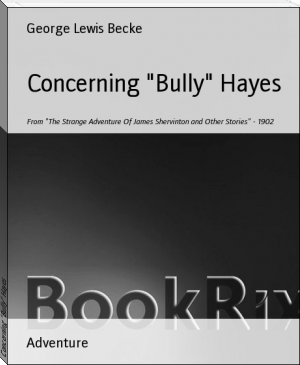Ridan The Devil And Other Stories - George Lewis Becke (free ebooks for android txt) 📗

- Author: George Lewis Becke
Book online «Ridan The Devil And Other Stories - George Lewis Becke (free ebooks for android txt) 📗». Author George Lewis Becke
are black, with large, irregular patches or streaks of pure white or yellow; others are dark brown with black and yellow patches. One, which I saw ashore on the reef at the island of Nukulaelae in the South Pacific, was nearly black, except for a few irregular blotches of white on the back and belly. This particular killer had died from starvation, for nearly the entire lower jaw had decayed from a cancerous growth.
The whaling station at Twofold Bay is now, alas! the only one in the colony--the last remnant of a once great and thriving industry, which, in the early days of the then struggling colony, was the nursery of bold and adventurous seamen. It is now carried on by a family named Davidson, father and sons--in conjunction with the killers. And for more than twenty years this business partnership has existed between the humans and the cetaceans, and the utmost rectitude and solicitude for each other's interests has always been maintained. _Orca gladiator_ seizes the whale for the Davidsons and holds him until the deadly lance is plunged into his 'life,' and the Davidssons let Orca carry the carcass to the bottom, and take his tithe of luscious blubber. This is the literal truth; and grizzled old Davidson, or any one of the stalwart sons who man his two boats, will tell you that but for the killers, who do half of the work, whaling would not pay with oil only worth from L18 to L24 a tun.
Let us imagine a warm, sunny day in August at Twofold Bay. The man who is on the lookout at the old lighthouse, built by Ben Boyd on the southern headland fifty years ago, paces to and fro on the grassy sward, stopping now and then to scan the wide expanse of ocean with his glass, for the spout of a whale is hard to discern at more than two miles if the weather is not clear. If the creature is in a playful mood and 'breaches,' that is, springs bodily out of the water and sends up a white volume of foam and spray, like the discharge of a submarine mine, you can see it eight miles away.
The two boats are always in readiness at the trying-out works, a mile or so up the harbour; so, too, are the killers; and the look-out man, walking to the verge of the cliff, looks down. There they are, cruising slowly up and down, close in-shore, spouting lazily and showing their wet, gleaming backs as they rise, roll and dive again. There's 'Fatty,' and 'Spot,' and 'Flukey,' and 'Little Jim,' and 'Paddy,' and 'Tom Tug.' Nearly every one of them has a name, and each is well known to his human friends.
Presently the watchman sees, away to the southward, a white, misty puff, then another, and another. In an instant he brings his glass to bear, 'Humpbacks!' Quickly two flags flutter from the flagpole, and a fire is lit; and as the flags and smoke are seen, the waiting boats' crews at the trying-out station are galvanised into life by the cry of 'Rush, ho, lads! Humpbacks in sight, steering north-west!' Rush and tumble into the boats and away!
Round the south head sweeps the first boat, the second following more leisurely, for she is only a 'pick-up' or relief, in case the first is 'fluked' and the crew are tossed high in air, with their boat crushed into matchwood, or meets with some other disaster. And as the leading boat rises to the long ocean swell of the offing, the killers close in round her on either side, just keeping clear of the sweep of the oars, and 'breaching' and leaping and spouting with the anticipative zest of the coming bloody fray.
'Easy, lads, easy!' says the old boat-header; 'they're coming right down on us. Billy was right. They're humpbacks, sure enough!'
The panting oarsmen pull a slower stroke, and then, as they watch the great, savage creatures which swim alongside, they laugh in the mirthless manner peculiar to most young native-born Australians, for suddenly, with a last sharp spurt of vapour, the killers dive and disappear into the dark blue beneath; for they have heard the whales, and, as is their custom, have gone ahead of the boat, rushing swiftly on below full fifty fathoms deep. Fifteen minutes later they rise to the surface in the midst of the humpbacks, and half a square acre of ocean is turned into a white, swirling cauldron of foam and leaping spray. The bull-dogs of the sea have seized the largest whale of the school, and are holding him for the boat and for the deadly lance of his human foes. The rest of the humpbacks raise high their mighty flukes and 'sound,' a hundred--two hundred--fathoms down, and, speeding seaward, leave the unfortunate bull to his dreadful fate.
(And, in truth, it is a dreadful fate, and the writer of this sketch can never forget how one day, as he and a little girl of six watched, from a grassy headland on the coast of New South Wales, the slaughter of a monstrous whale by a drove of killers, that the child wept and shuddered and hid her face against his shoulder.)
Ranging swiftly alongside of him, from his great head down to the 'small' of his back, the fierce killers seize his body in their savage jaws and tear great strips of skin and blubber from off his writhing sides in huge mouthfuls, and then jerking the masses aside, take another and another bite. In vain he sweeps his flukes with fearful strokes from side to side--the bulldogs of the sea come not within their range; in vain he tries to 'sound'--there is a devil on each side of his jaws, their cruel teeth fixed firmly into his huge lips; perhaps two or three are underneath him tearing and riving at the great tough corrugations of his grey-ribbed belly; whilst others, with a few swift vertical strokes of their flukes, draw back for fifty feet or so, charge him amidships, and strike him fearful blows on the ribs with their bony heads. Round and round, in ever-narrowing circles as his strength fails, the tortured humpback swims, sometimes turning on his back or side, but failing, failing fast.
'He's done for, lads. Pull up; stand up, Jim.'
The boat dashes up, and Jim, the man who is pulling bow oar, picks up his harpoon. A minute later, it flies from his hand and is buried deep into the body of the quivering animal, cutting through the thick blubber as a razor would cut through the skin of a drum.
'Stern all!' and the harpooner tumbles aft and grips the steer oar, and the steersman takes his place in the head of the boat with his keen-edged lance. But 'humpy' is almost spent, and though by a mighty effort he 'ups flukes,' and sounds, he soon rises, for the killers thrust him upwards to the surface again. Then the flashing lance, two, three swift blows into his 'life,' a gushing torrent of hot, dark blood, he rolls over on his side, an agonised trembling quivers through his vast frame, the battle is over and his life is gone.
And now comes the curious and yet absolutely truly described final part that the killers play in this ocean tragedy. They, the moment the whale is dead, close around him, and fastening their teeth into his body, by main strength bear it to the bottom. Here--if they have not already accomplished it--they tear out the tongue and eat about one-third of the blubber. In from thirty-six to forty hours the carcass will again rise to the surface, and as, before he was taken down, the whalemen have attached a line and buoy to the body, its whereabouts is easily discerned from the lookout on the headland; the boats again put off and tow it ashore to the trying-out works. The killers, though they have had their fill of blubber, accompany the boats to the head of the bay and keep off the sharks, which would otherwise strip off all the remaining blubber from the carcass before it had reached the shore. But once the boats are in the shallow water the killers stop, and then with a final 'puff! puff!' of farewell to their human friends, turn and head seaward to resume their ceaseless watch and patrol of the ocean.
The killers never hurt a man. Time after time have boats been stove-in or smashed into splinters by a whale, either by an accidental blow from his head or a sudden lateral sweep of his monstrous flukes, and the crew left struggling in the water or clinging to the oars and pieces of wreckage; and the killers have swum up to, looked at, and _smelt_ them--but never have they touched a man with intent to do him harm. And wherever the killers are, the sharks are not, for Jack Shark dreads a killer as the devil is said to dread holy water. Sometimes I have seen 'Jack' make a rush in between the killers, and rip off a piece of hanging blubber, but he will carefully watch his chance to do so.
On some occasions, when a pack of killers set out whale-hunting, they will be joined by a thresher--the fox-shark (Alopias vulpes)--and then while the killers bite and tear the unfortunate cetacean, the thresher deals him fearful blows with his scythe-like tail. The master of a whaling vessel told me that off the north end of New Caledonia, there was, from 1868 till 1876, a pack of nine killers which were always attended by two threshers and a sword-fish. Not only he, but many other whaling skippers had seen this particular swordfish, year after year, joining the killers in attacks upon whales. The cruising ground of this pack extended for thirty miles, north and south, and the nine creatures and their associates were well known to hundreds of New Bedford whalemen. No doubt many of these combats, witnessed from merchant ships, have led to many sea-serpent stories; for when a thresher stands his twenty feet of slender body straight up on end like a pole, he presents a strange sight, as his long body sways, and curves, and twists in air, as he deals his cutting blows upon his victim. Then, too, the enormous length of the pectoral fins of a humpback whale, which show dazzlingly white as he rolls from side to side in his agony, and frantically beats the water with them in his struggles, or upends one after the other like a mast, might well be mistaken for the uprearing of a serpent's body. But any South Sea whaleman will smile when he hears talk of the sea-serpent, though he has not forgotten the awe and fascination with which he was filled, when he first saw a whale in the agonies of combat with _Alopias vulpes_ and _Orca gladiator_, and the serpentine evolutions of the former creature.
The whaleman in the Pacific sees very strange and wondrous sights; and never, since Herman Melville wrote his strangely exciting and weird book, 'The Whale,' nearly fifty years ago, has any writer given us such a vivid and true picture of whaling life and incident as Mr Frank T. Bullen in his 'Cruise of the _Cachalot_ published this year.
DENISON'S SECOND BERTH ASHORE
The whaling station at Twofold Bay is now, alas! the only one in the colony--the last remnant of a once great and thriving industry, which, in the early days of the then struggling colony, was the nursery of bold and adventurous seamen. It is now carried on by a family named Davidson, father and sons--in conjunction with the killers. And for more than twenty years this business partnership has existed between the humans and the cetaceans, and the utmost rectitude and solicitude for each other's interests has always been maintained. _Orca gladiator_ seizes the whale for the Davidsons and holds him until the deadly lance is plunged into his 'life,' and the Davidssons let Orca carry the carcass to the bottom, and take his tithe of luscious blubber. This is the literal truth; and grizzled old Davidson, or any one of the stalwart sons who man his two boats, will tell you that but for the killers, who do half of the work, whaling would not pay with oil only worth from L18 to L24 a tun.
Let us imagine a warm, sunny day in August at Twofold Bay. The man who is on the lookout at the old lighthouse, built by Ben Boyd on the southern headland fifty years ago, paces to and fro on the grassy sward, stopping now and then to scan the wide expanse of ocean with his glass, for the spout of a whale is hard to discern at more than two miles if the weather is not clear. If the creature is in a playful mood and 'breaches,' that is, springs bodily out of the water and sends up a white volume of foam and spray, like the discharge of a submarine mine, you can see it eight miles away.
The two boats are always in readiness at the trying-out works, a mile or so up the harbour; so, too, are the killers; and the look-out man, walking to the verge of the cliff, looks down. There they are, cruising slowly up and down, close in-shore, spouting lazily and showing their wet, gleaming backs as they rise, roll and dive again. There's 'Fatty,' and 'Spot,' and 'Flukey,' and 'Little Jim,' and 'Paddy,' and 'Tom Tug.' Nearly every one of them has a name, and each is well known to his human friends.
Presently the watchman sees, away to the southward, a white, misty puff, then another, and another. In an instant he brings his glass to bear, 'Humpbacks!' Quickly two flags flutter from the flagpole, and a fire is lit; and as the flags and smoke are seen, the waiting boats' crews at the trying-out station are galvanised into life by the cry of 'Rush, ho, lads! Humpbacks in sight, steering north-west!' Rush and tumble into the boats and away!
Round the south head sweeps the first boat, the second following more leisurely, for she is only a 'pick-up' or relief, in case the first is 'fluked' and the crew are tossed high in air, with their boat crushed into matchwood, or meets with some other disaster. And as the leading boat rises to the long ocean swell of the offing, the killers close in round her on either side, just keeping clear of the sweep of the oars, and 'breaching' and leaping and spouting with the anticipative zest of the coming bloody fray.
'Easy, lads, easy!' says the old boat-header; 'they're coming right down on us. Billy was right. They're humpbacks, sure enough!'
The panting oarsmen pull a slower stroke, and then, as they watch the great, savage creatures which swim alongside, they laugh in the mirthless manner peculiar to most young native-born Australians, for suddenly, with a last sharp spurt of vapour, the killers dive and disappear into the dark blue beneath; for they have heard the whales, and, as is their custom, have gone ahead of the boat, rushing swiftly on below full fifty fathoms deep. Fifteen minutes later they rise to the surface in the midst of the humpbacks, and half a square acre of ocean is turned into a white, swirling cauldron of foam and leaping spray. The bull-dogs of the sea have seized the largest whale of the school, and are holding him for the boat and for the deadly lance of his human foes. The rest of the humpbacks raise high their mighty flukes and 'sound,' a hundred--two hundred--fathoms down, and, speeding seaward, leave the unfortunate bull to his dreadful fate.
(And, in truth, it is a dreadful fate, and the writer of this sketch can never forget how one day, as he and a little girl of six watched, from a grassy headland on the coast of New South Wales, the slaughter of a monstrous whale by a drove of killers, that the child wept and shuddered and hid her face against his shoulder.)
Ranging swiftly alongside of him, from his great head down to the 'small' of his back, the fierce killers seize his body in their savage jaws and tear great strips of skin and blubber from off his writhing sides in huge mouthfuls, and then jerking the masses aside, take another and another bite. In vain he sweeps his flukes with fearful strokes from side to side--the bulldogs of the sea come not within their range; in vain he tries to 'sound'--there is a devil on each side of his jaws, their cruel teeth fixed firmly into his huge lips; perhaps two or three are underneath him tearing and riving at the great tough corrugations of his grey-ribbed belly; whilst others, with a few swift vertical strokes of their flukes, draw back for fifty feet or so, charge him amidships, and strike him fearful blows on the ribs with their bony heads. Round and round, in ever-narrowing circles as his strength fails, the tortured humpback swims, sometimes turning on his back or side, but failing, failing fast.
'He's done for, lads. Pull up; stand up, Jim.'
The boat dashes up, and Jim, the man who is pulling bow oar, picks up his harpoon. A minute later, it flies from his hand and is buried deep into the body of the quivering animal, cutting through the thick blubber as a razor would cut through the skin of a drum.
'Stern all!' and the harpooner tumbles aft and grips the steer oar, and the steersman takes his place in the head of the boat with his keen-edged lance. But 'humpy' is almost spent, and though by a mighty effort he 'ups flukes,' and sounds, he soon rises, for the killers thrust him upwards to the surface again. Then the flashing lance, two, three swift blows into his 'life,' a gushing torrent of hot, dark blood, he rolls over on his side, an agonised trembling quivers through his vast frame, the battle is over and his life is gone.
And now comes the curious and yet absolutely truly described final part that the killers play in this ocean tragedy. They, the moment the whale is dead, close around him, and fastening their teeth into his body, by main strength bear it to the bottom. Here--if they have not already accomplished it--they tear out the tongue and eat about one-third of the blubber. In from thirty-six to forty hours the carcass will again rise to the surface, and as, before he was taken down, the whalemen have attached a line and buoy to the body, its whereabouts is easily discerned from the lookout on the headland; the boats again put off and tow it ashore to the trying-out works. The killers, though they have had their fill of blubber, accompany the boats to the head of the bay and keep off the sharks, which would otherwise strip off all the remaining blubber from the carcass before it had reached the shore. But once the boats are in the shallow water the killers stop, and then with a final 'puff! puff!' of farewell to their human friends, turn and head seaward to resume their ceaseless watch and patrol of the ocean.
The killers never hurt a man. Time after time have boats been stove-in or smashed into splinters by a whale, either by an accidental blow from his head or a sudden lateral sweep of his monstrous flukes, and the crew left struggling in the water or clinging to the oars and pieces of wreckage; and the killers have swum up to, looked at, and _smelt_ them--but never have they touched a man with intent to do him harm. And wherever the killers are, the sharks are not, for Jack Shark dreads a killer as the devil is said to dread holy water. Sometimes I have seen 'Jack' make a rush in between the killers, and rip off a piece of hanging blubber, but he will carefully watch his chance to do so.
On some occasions, when a pack of killers set out whale-hunting, they will be joined by a thresher--the fox-shark (Alopias vulpes)--and then while the killers bite and tear the unfortunate cetacean, the thresher deals him fearful blows with his scythe-like tail. The master of a whaling vessel told me that off the north end of New Caledonia, there was, from 1868 till 1876, a pack of nine killers which were always attended by two threshers and a sword-fish. Not only he, but many other whaling skippers had seen this particular swordfish, year after year, joining the killers in attacks upon whales. The cruising ground of this pack extended for thirty miles, north and south, and the nine creatures and their associates were well known to hundreds of New Bedford whalemen. No doubt many of these combats, witnessed from merchant ships, have led to many sea-serpent stories; for when a thresher stands his twenty feet of slender body straight up on end like a pole, he presents a strange sight, as his long body sways, and curves, and twists in air, as he deals his cutting blows upon his victim. Then, too, the enormous length of the pectoral fins of a humpback whale, which show dazzlingly white as he rolls from side to side in his agony, and frantically beats the water with them in his struggles, or upends one after the other like a mast, might well be mistaken for the uprearing of a serpent's body. But any South Sea whaleman will smile when he hears talk of the sea-serpent, though he has not forgotten the awe and fascination with which he was filled, when he first saw a whale in the agonies of combat with _Alopias vulpes_ and _Orca gladiator_, and the serpentine evolutions of the former creature.
The whaleman in the Pacific sees very strange and wondrous sights; and never, since Herman Melville wrote his strangely exciting and weird book, 'The Whale,' nearly fifty years ago, has any writer given us such a vivid and true picture of whaling life and incident as Mr Frank T. Bullen in his 'Cruise of the _Cachalot_ published this year.
DENISON'S SECOND BERTH ASHORE
I have already told how Tom Denison, the South Sea Island supercargo, took a berth ashore as overseer of a Queensland duck farm, which was mortgaged to a bank of which his brother was manager, and how he resigned the post in great despondency, and humped his swag to Cooktown.
Over his meeting with his brother let a veil be drawn. Suffice it to say that the
Free e-book «Ridan The Devil And Other Stories - George Lewis Becke (free ebooks for android txt) 📗» - read online now
Similar e-books:





Comments (0)